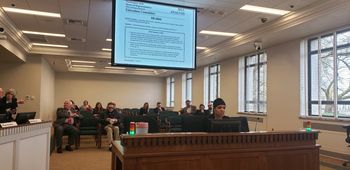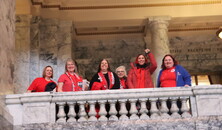This Week in Olympia

Week of Feb. 24, 2020
The House and Senate released their budgets on Monday and held hearings on them Monday afternoon.
The House budget bill, HB 2325, was voted out of Appropriations on Wednesday.
The Senate bill, SB 6168, was voted out of Ways and Means on Tuesday and off the Senate floor on Thursday. We anticipate that the House will approve a striking amendment to the Senate budget. This means the House will insert its budget into SB 6168 and vote it out of the House late in the day today (Friday). This sets up the conference process for budget negotiations.
The next steps will be for a House and Senate budget negotiators to meet and resolve differences and to agree on a final budget before the session ends in just under two weeks, on Thurs., March 12.
The budgets address many WEA legislative priorities, including funds for paraeducator training; additional counselors; special education, and staff training on racial literacy and cultural responsiveness. The budgets also address funding for student transportation and local effort assistance. However, each budget falls short of fully addressing the needs of our students, and they each make different investments in public education.
The House proposal adds more than $50 million for counselors, providing funding for an additional 0.5 FTE counselor per prototypical school – for schools with 50 percent or higher of their students qualifying for free and reduced price lunch. The Senate proposal instead invests about $20 million for special education – with roughly half of it being distributed through the formula, and the rest being allocated to the safety net.
WEA was also able to work with legislators to add spending provisos to the budgets to advance some of our legislative priorities. Some that were included in the Senate or House budget proposals are listed below, but all will still need to be included in the final conference budget to be funded.
- Establishing a technical advisory committee to support teacher residency pilots in the 21-22 school year (House budget)
- Creating tribal studies curricula for integration into social studies learning standards (Senate budget)
- Creating a framework for family engagement to address educational equity (House budget)
- Supporting curricula to add African American History, racism and civil rights in grades 7-12 (different funding amounts, House and Senate)
- Continuing work to support Ethnic Studies (different funding amounts, House and Senate)
- Providing professional learning and technical assistance about Native American history (House budget)
- Directing the Education Ombuds to develop a plan to promote diversity, equity and inclusion among families with school-aged children. (Senate budget)
- Collecting higher ed financial data that is more transparent to ensure the public and our members have access to the same type of consistent information about the sources and uses of funds that exists in K-12 education (House budget)
- Providing training and outreach to ensure all families regardless of their immigration status know their rights to a free public education. (Senate budget)
- Providing funds for a Tribal liaison (both House and Senate) and a Government to Government Education Task Force (Senate budget)
- Directing the Education Opportunity Gap Oversight and Accountability Committee to conduct a bias review of the WA Kids Assessment (House and Senate)
- Prioritizing equity professional learning for public school employees (House and Senate)
- Launching a pilot program to coordinate the building of student, faculty and staff affordable housing at four community and technical colleges. (House budget)
Not all included provisos were among WEA priorities. For instance, a proviso in the House budget adds a total of about $14 million for small schools, and while most would go to Tribal Schools and other small public schools, about $3 million would be allocated for charter schools. WEA does not support additional funds for charter schools and will advocate to have those resources directed toward more appropriate uses.
Bill Action This Week in Olympia
Friday was the last day for bills to pass out of the policy committee of the opposite chamber. If the bill has a fiscal impact to the state, it will need to pass out of the fiscal committees in each chamber by Monday.
Promoting equity and combating racism
HB 2551 Would permit students to wear traditional tribal regalia and objects of cultural significance at graduation ceremonies and related events. It is in the Senate Rules committee. WEA supports.
HB 2602 Concerning hair discrimination, would prohibit discrimination because people have afros, braids, locks or twists. It is in the Senate Rules committee. WEA supports.
HB 2711 Would address equitable educational outcomes for foster care and homeless children. It had a hearing in Senate Ways and Means on Friday. WEA supports.
SB 5834 Would inform parents about students’ rights to a free public education without regard to immigration status or religion. It had a public hearing on Tuesday. While WEA supported this bill, it failed to pass out of committee on cut off day due to a lack of time.
SB 5908 Would provide equity and cultural competency professional learning for public school employees and school boards. WEA member Glenn Jenkins testified in favor of this bill at Tuesday’s hearing in House Ed. While WEA supported this bill, it failed to pass out of committee, again due to lack of time.
SB 6066 Would expand ethnic studies materials and resources for K – 6 grades. It passed out of the House Education on Tuesday. WEA supports.
SB 6262 Would require teaching local tribal history, culture, and government by 2022. It had a hearing on Tuesday. While WEA supported this bill, it failed to pass out of committee due to lack of time.
Safety for students and staff
ESHB 1264 Would require OSPI to develop online training modules to support educators with secondary traumatic stress, and include it in the training topics if more training days are funded by the state. It was voted out of committee on Friday. WEA supports.
HB 1860 Would test for lead in drinking water fixtures in schools. It had a public hearing in the Senate Early Learning K-12 committee on Wednesday. WEA supports. This bill did not make it out of committee before the deadline.
HB 1888 Would limit access to employee photos, phone numbers and payroll deduction information. Only media outlets would have access to birth dates just as they do with law enforcement and criminal justice employees. It had a hearing in the Ways and Means Committee Friday. WEA Supports.
SB 5395 Is the comprehensive sexual health education bill. It was approved by the House Education committee on Thursday after a 3.5 hour debate over amendments and content. WEA supports.
HB 2947 Would limit high capacity magazines and add a gun buy-back program. It had a hearing in House Finance on Tuesday. Will likely be considered necessary to implement the budget and could stay alive beyond Friday. WEA supports.
Recruiting and retaining quality staff
HB 2458 Would allow districts to offer optional benefits if they are not offered as part of the School Employee Benefit Board program. The bill clearly states that districts have authority to continue VEBA plans and other benefits such as cancer care and financial protection plans through payroll deduction. It had a public hearing in Ways and Means on Wednesday, and is scheduled for a vote in the committee later today (Friday). This bill is supported by WEA, insurers, and school administrators.
SB 6512 Would allow K-12 districts to establish affordable housing for employees in order to attract and retain all K-12 employees. Districts would also be able to work with their communities on cross-sector housing complexes. This bill is scheduled for a vote in the Senate Ways and Means committee on Friday night. WEA supports.
HB 1390 and SB 5400 Would provide a Plan 1 increase of 3 percent up to $62.50 per month for retirees. This is the recommended COLA from the Select Committee on Pension Policy, which was funded in both budgets. HB 1390 had a hearing in Ways and Means on Friday but was not voted out of committee. SB 5400 has been referred to House Appropriations. WEA and WEA-Retired support this legislation.
SB 6138 Would provide additional support for teachers and mentors of color as part of the BEST program. It had a public hearing in House Education. While WEA supported this bill, it failed to pass out of committee due to lack of time.
Improving learning conditions
SB 6141 Would make financial aid packages and processes easier to understand. It was voted out of the House College and Workforce Development committee on Wednesday. WEA Supports.
HB 2660 Would expand school meals for students. It was voted out of the Senate Early Learning and K-12 on Friday. WEA supports.
OSPI request legislation, SB 6117 would provide funds for special education and has been referred to Appropriations. This bill falls short of the $300 million funding gap that exists in special education. This bill is expected to be scheduled for a hearing in House Appropriations before the fiscal deadline.
SB 6132 Would expand the allowable uses of the Learning Assistance Program (LAP) to include student supports for behavioral health through a school-wide system of supports. It failed to pass out of committee, but the Senate added its language was added in a proposed striking amendment to 2SHB 1182, which is still alive and moving to the Ways and Means committee.
SB 6480 Would develop comprehensive school counselor programs. It was referred to the House Education, but failed to pass out of committee. WEA supported this bill.
HB 2116 Would establish a joint-select legislative task force on improving institutional education programs and outcomes. This task force will make recommendations about funding and educational improvements for students who are incarcerated in county or state facilities. This bill was passed by the Senate Early Learning and K-12 committee on Wednesday. Steve Staaden, a teacher from Greenhill School in the Chehalis School district testified in support of this bill. WEA supports.
Next Week in Olympia
The fiscal deadline is Monday, meaning bills must be approved by the fiscal committee of the other chamber in order to stay alive. The remaining days of session will focus on floor action to approve final agreements on bills. A few committee hearings may occur, but most of the time will be focused on floor votes and budget conference negotiations.


